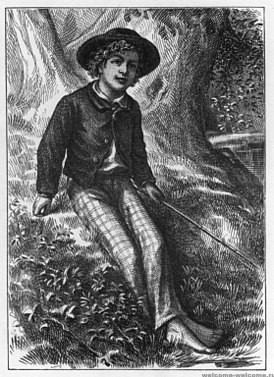Возрастная категория до 8 лет: к переводу предлагается лимерик.
 00
00
There was an Old Man with a nose,
Who said, ‘If you choose to suppose,
That my nose is too long,
You are certainly wrong!’
That remarkable Man with a nose.
(Edward Lear)
* Лимерики – это короткие комические стихи, в 5 строках описывающие какое-нибудь нелепое или нереальное происшествие (наподобие наших частушек). Согласно одной из версий, название лимерики получили в честь небольшого ирландского портового города Limerick – возможно, потому, что в середине XVII столетия озорные комические пятистишия распевали именно ирландские солдаты, служившие французскому королю Людовику XIV. Долгое время лимерики считались исключительно народным творчеством – до того момента, как талантливый английский художник и поэт Эдвард Лир издал в 1821 году знаменитую на весь мир «Книгу нонсенса», или, как её ещё называют, «Книгу бессмыслиц». Книга была написана для детей, однако стала весьма популярной и среди взрослых читателей. Лимерик с одной из страниц этой книги мы и предлагаем вам к переводу.
Основное требование к переводу: смысл оригинала должен быть сохранен, количество строк в переводе строго регламентировано: стих должен быть составлен из 5 строк, при этом первая должна рифмоваться со второй и пятой, а третья – с четвёртой, например:
К старику, неразлучному с флейтой,
Змей в сапог проскользнул пёстрой лентой;
Тот играл день и ночь,
Гаду стало невмочь,
Дал он дёру от дедушки с флейтой.
Возрастная категория от 9 до 12 лет: к переводу предлагается отрывок из произведения Марка Твена «Приключения Тома Сойера»:
 <…>SATURDAY morning was come, and all the summer world was bright and fresh, and brimming with life. There was a song in every heart; and if the heart was young the music issued at the lips. There was cheer in every face and a spring in every step. The locust-trees were in bloom and the fragrance of the blossoms filled the air. Cardiff Hill, beyond the village and above it, was green with vegetation and it lay just far enough away to seem a Delectable Land, dreamy, reposeful, and inviting. Tom appeared on the sidewalk with a bucket of whitewash and a long-handled brush. He surveyed the fence, and all gladness left him and a deep melancholy settled down upon his spirit. Thirty yards of board fence nine feet high. Life to him seemed hollow, and existence but a burden. Sighing, he dipped his brush and passed it along the topmost plank; repeated the operation; did it again; compared the insignificant whitewashed streak with the far-reaching continent of unwhitewashed fence, and sat down on a treebox discouraged. Jim came skipping out at the gate with a tin pail, and singing Buffalo Gals. Bringing water from the town pump had always been hateful work in Tom’s eyes, before, but now it did not strike him so. He remembered that there was company at the pump. White, mulatto, and negro boys and girls were always there waiting their turns, resting, trading playthings, quarrelling, fighting, skylarking. And he remembered that although the pump was only a hundred and fifty yards off, Jim never got back with a bucket of water under an hour — and even then somebody generally had to go after him. <…>
<…>SATURDAY morning was come, and all the summer world was bright and fresh, and brimming with life. There was a song in every heart; and if the heart was young the music issued at the lips. There was cheer in every face and a spring in every step. The locust-trees were in bloom and the fragrance of the blossoms filled the air. Cardiff Hill, beyond the village and above it, was green with vegetation and it lay just far enough away to seem a Delectable Land, dreamy, reposeful, and inviting. Tom appeared on the sidewalk with a bucket of whitewash and a long-handled brush. He surveyed the fence, and all gladness left him and a deep melancholy settled down upon his spirit. Thirty yards of board fence nine feet high. Life to him seemed hollow, and existence but a burden. Sighing, he dipped his brush and passed it along the topmost plank; repeated the operation; did it again; compared the insignificant whitewashed streak with the far-reaching continent of unwhitewashed fence, and sat down on a treebox discouraged. Jim came skipping out at the gate with a tin pail, and singing Buffalo Gals. Bringing water from the town pump had always been hateful work in Tom’s eyes, before, but now it did not strike him so. He remembered that there was company at the pump. White, mulatto, and negro boys and girls were always there waiting their turns, resting, trading playthings, quarrelling, fighting, skylarking. And he remembered that although the pump was only a hundred and fifty yards off, Jim never got back with a bucket of water under an hour — and even then somebody generally had to go after him. <…>
(Mark Twain «The Adventures of Tom Sawyer»)
Основное требование к переводу: смысл оригинала должен быть сохранен.
Возрастная категория от 13 лет: к переводу предлагается на выбор отрывок из романа Джерома К. Джерома «Трое в лодке, не считая собаки», либо Второй Сонет Уильяма Шекспира:
<…> I remember going to the British Museum one day to read up the treatment for some slight ailment of which I had a touch—hay fever, I fancy it was. I got down the book, and read all I came to read; and then, in an unthinking moment, I idly turned the leaves, and began to indolently study diseases, generally. I forget which was the first distemper I plunged into—some fearful, devastating scourge, I know—and, before I had glanced half down the list of “premonitory symptoms,” it was borne in upon me that I had fairly got it. I sat for awhile, frozen with horror; and then, in the list-lessness of despair, I again turned over the pages. I came to typhoid fever—read the symptoms—discovered that I had typhoid fever, must have had it for months without knowing it—wondered what else I had got; turned up St. Vitus’s Dance—found, as I expected, that I had that too,—began to get interested in my case, and determined to sift it to the bottom, and so started alphabetically—read up ague, and learnt that I was sickening for it, and that the acute stage would commence in about another fortnight. Bright’s disease, I was relieved to find, I had only in a modified form, and, so far as that was concerned, I might live for years. Cholera I had, with severe complications; and diphtheria I seemed to have been born with. I plodded conscientiously through the twenty-six letters, and the only malady I could conclude I had not got was housemaid’s knee. I felt rather hurt about this at first; it seemed somehow to be a sort of slight. Why hadn’t I got housemaid’s knee? Why this invidious reservation? After a while, however, less grasping feelings prevailed. I reflected that I had every other known malady in the pharmacology, and I grew less selfish, and determined to do without housemaid’s knee. Gout, in its most malignant stage, it would appear, had seized me without my being aware of it; and zymosis I had evidently been suffering with from boyhood. There were no more diseases after zymosis, so I concluded there was nothing else the matter with me. I sat and pondered. I thought what an interesting case I must be from a medical point of view, what an acquisition I should be to a class! Students would have no need to “walk the hospitals,” if they had me. I was a hospital in myself. All they need do would be to walk round me, and, after that, take their diploma. Then I wondered how long I had to live. I tried to examine myself. I felt my pulse. I could not at first feel any pulse at all. Then, all of a sudden, it seemed to start off. I pulled out my watch and timed it. I made it a hundred and forty-seven to the minute. I tried to feel my heart. I could not feel my heart. It had stopped beating. I have since been induced to come to the opinion that it must have been there all the time, and must have been beating, but I cannot account for it. I patted myself all over my front, from what I call my waist up to my head, and I went a bit round each side, and a little way up the back. But I could not feel or hear anything. I tried to look at my tongue. I stuck it out as far as ever it would go, and I shut one eye, and tried to examine it with the other. I could only see the tip, and the only thing that I could gain from that was to feel more certain than before that I had scarlet fever. I had walked into that reading-room a happy, healthy man. I crawled out a decrepit wreck.<…>
(Jerome K. Jerome “Three Men in a Boat (To Say Nothing of the Dog”)
When forty winters shall beseige thy brow,
And dig deep trenches in thy beauty’s field,
Thy youth’s proud livery, so gazed on now,
Will be a tatter’d weed, of small worth held:
Then being ask’d where all thy beauty lies,
Where all the treasure of thy lusty days,
To say, within thine own deep-sunken eyes,
Were an all-eating shame and thriftless praise.
How much more praise deserved thy beauty’s use,
If thou couldst answer ‘This fair child of mine
Shall sum my count and make my old excuse,
Proving his beauty by succession thine!
This were to be new made when thou art old,
And see thy blood warm when thou feel’st it cold.
(Sonnet II, W. Shakespeare)
Когда твое чело избороздят
Глубокими следами сорок зим,
Кто будет помнить царственный наряд,
Гнушаясь жалким рубищем твоим?
И на вопрос: “Где прячутся сейчас
Остатки красоты веселых лет?” -
Что скажешь ты? На дне угасших глаз?
Но злой насмешкой будет твой ответ.
Достойней прозвучали бы слова:
“Вы посмотрите на моих детей.
Моя былая свежесть в них жива,
В них оправданье старости моей”.
Пускай с годами стынущая кровь
В наследнике твоем пылает вновь!
(C. Маршак)
Основное требование к переводу: смысл оригинала должен быть сохранен, строки лирического произведения должны быть зарифмованы, при переводе сонета обязательно сохранение формы (3 четверостишия+1 двустишие).
Мы ждем писем с Вашими переводами на почту welcome.challenge@yandex.ru с 7 по 21 апреля 2020 года включительно. В теме письма обозначьте название конкурса «Литературный перевод», прикрепите документ Word с переводом, укажите имя, фамилию, возраст.








 Апрель 7th, 2020
Апрель 7th, 2020  Администратор
Администратор 
 Опубликовано в рубрике
Опубликовано в рубрике 






